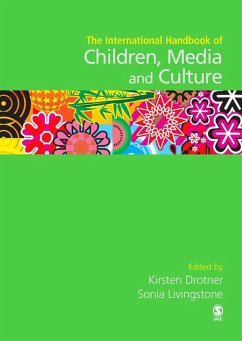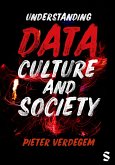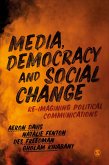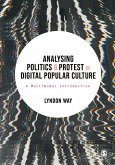This essential volume brings together the work of internationally-renowned researchers, each experts in their field, in order to capture the diversity of children and young people's media cultures around the world.
Why are the media such a crucial part of children's daily lives? Are they becoming more important, more influential, and in what ways? Or does a historical perspective reveal how past media have long framed children's cultural horizons or, perhaps, how families - however constituted - have long shaped the ways children relate to media?
In addressing such questions, the contributors present detailed empirical cases to uncover how children weave together diverse forms and technologies to create a rich symbolic tapestry which, in turn, shapes their social relationships. At the same time, many concerns - even public panics - arise regarding children's engagement with media, leading the contributors also to inquire into the risky or problematic aspects of today's highly mediated world.
Deliberately selected to represent as many parts of the globe as possible, and with a commitment to recognizing both the similarities and differences in children and young people's lives - from China to Denmark, from Canada to India, from Japan to Iceland, from - the authors offer a rich contextualization of children's engagement with their particular media and communication environment, while also pursuing cross-cutting themes in terms of comparative and global trends.
Each chapter provides a clear orientation for new readers to the main debates and core issues addressed, combined with a depth of analysis and argumentation to stimulate the thinking of advanced students and established scholars. Since children and young people are a focus of study across different disciplines, the volume is thoroughly multi-disciplinary. Yet since children and young people are all too easily neglected by these same disciplines, this volume hopes to accord their interests and concerns they surely merit.
Why are the media such a crucial part of children's daily lives? Are they becoming more important, more influential, and in what ways? Or does a historical perspective reveal how past media have long framed children's cultural horizons or, perhaps, how families - however constituted - have long shaped the ways children relate to media?
In addressing such questions, the contributors present detailed empirical cases to uncover how children weave together diverse forms and technologies to create a rich symbolic tapestry which, in turn, shapes their social relationships. At the same time, many concerns - even public panics - arise regarding children's engagement with media, leading the contributors also to inquire into the risky or problematic aspects of today's highly mediated world.
Deliberately selected to represent as many parts of the globe as possible, and with a commitment to recognizing both the similarities and differences in children and young people's lives - from China to Denmark, from Canada to India, from Japan to Iceland, from - the authors offer a rich contextualization of children's engagement with their particular media and communication environment, while also pursuing cross-cutting themes in terms of comparative and global trends.
Each chapter provides a clear orientation for new readers to the main debates and core issues addressed, combined with a depth of analysis and argumentation to stimulate the thinking of advanced students and established scholars. Since children and young people are a focus of study across different disciplines, the volume is thoroughly multi-disciplinary. Yet since children and young people are all too easily neglected by these same disciplines, this volume hopes to accord their interests and concerns they surely merit.
Dieser Download kann aus rechtlichen Gründen nur mit Rechnungsadresse in A, D ausgeliefert werden.
This volume breaks new ground. Its ambitious goal is to deliver a holistic approach to children s culture... Sonia Livingstone and Kirsten Drotner are well equipped for the job of attempting such a radically inclusive approach. Both scholars have conducted transnational empirical audience research, and are therefore not naive when it comes to the difficulties of such an enterprise. They are appropriate public intellectuals to embark on a job of creating bridges between a range of geographically dispersed scholarly and political discourses... The volume provides a stimulating read for researchers in a range of disciplines. It also deserves to be recommended to media regulators, politicians and journalism students. International Journal of Media and Cultural Politics









